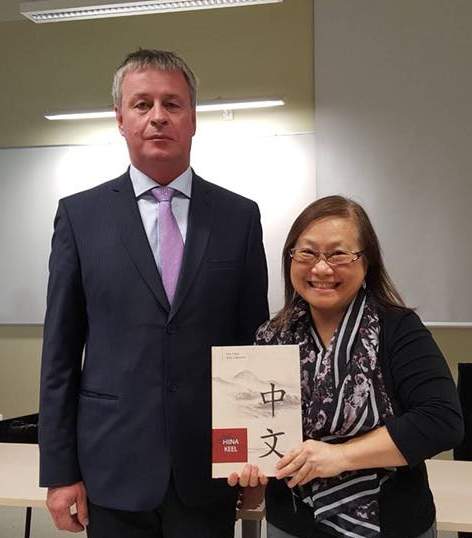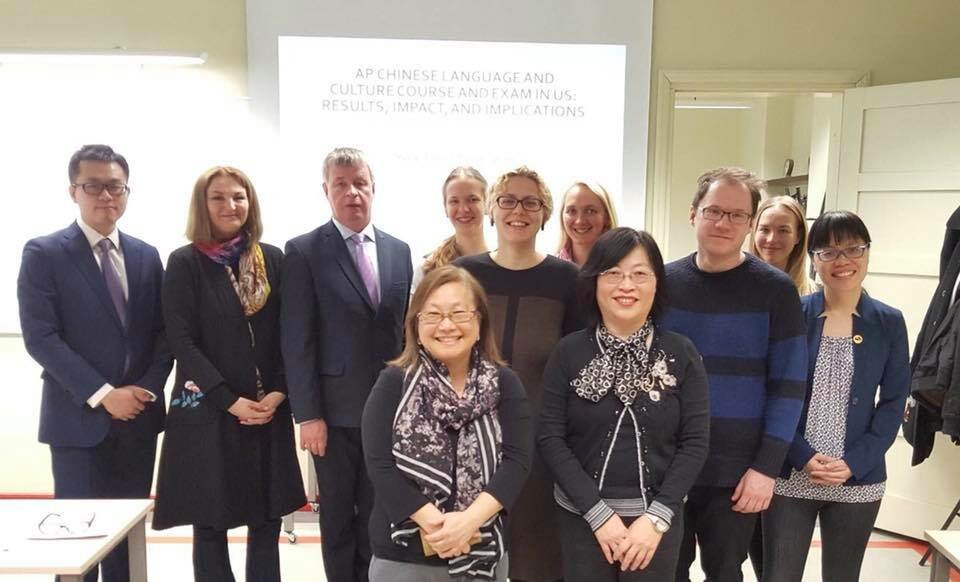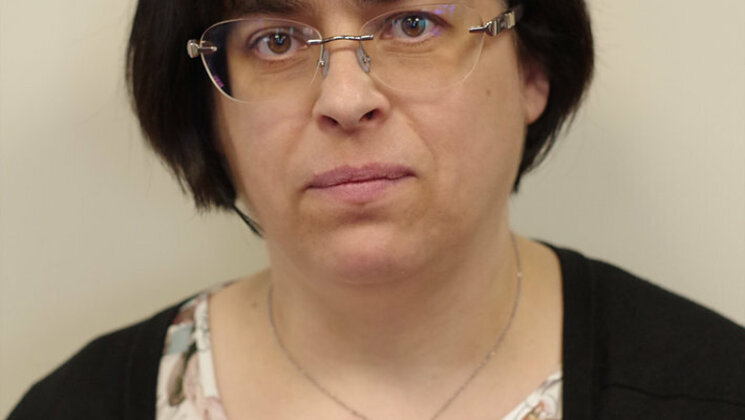University of Tartu College of Foreign Languages and Cultures hosted the first Chinese language teachers’ training seminar in Estonia and the Baltics.
Last week, on the 2-3 March, an international symposium titled “Teaching Mandarin in the Baltics” was held at the UT College of Foreign Languages and Cultures. The symposium focused on practical and methodological issues of teaching Mandarin Chinese as a foreign language.
 The symposium had two main topics: the impact of native linguistic patterns and cultural habits on teaching Chinese as a foreign language, and applying new practical methods in classroom teaching in order to advance the effectiveness of obtaining practical language skills.
The symposium had two main topics: the impact of native linguistic patterns and cultural habits on teaching Chinese as a foreign language, and applying new practical methods in classroom teaching in order to advance the effectiveness of obtaining practical language skills.
The conference was opened by Associate Professor Märt Läänemets, one of the initiators and main organisers of the symposium, who gave an overview of the history and current status of teaching Chinese at UT. He emphasized the need for this kind of practical symposiums as Chinese is becoming more popular and therefore it is important to advance special training methods.
The director of the college Kersti Lepajõe emphasized the development of teaching Asian languages in UT in recent years and the good cooperation that the university has had with embassies and funds that support language teaching.
Elo Süld, the head of the UT Asian Centre, said that she is pleased that the Asian Centre supports the teaching of Asian languages at UT. She also painted a vivid picture of how without knowing the local language one will always be communicating through a veil - some information will slip through the holes but a lot will stay hidden behind the veil. Therefore, knowing a language opens the door to understanding the local culture and history.
Peter Chang, representative of the Taipei Mission in the Republic of Latvia, thanked UT for the cooperation and encouraged students to apply for scholarships in Taiwan.
 The first key-note speech of the conference was given by Professor Yea-Fen Chen (University of Indiana, Bloomington, U.S.). Her speech was titled “AP Chinese Language and Culture Course and Exam in US: Results, Impact, and Implications.” Prof. Chen introduced an existing foreign language teaching system in the U.S. where universities offer college level language courses, including Chinese, to high schools. Successful participants will be able to receive credits once they become college students. An interesting aspect about the system is that everything is organized through the principle of equality: half of the teaching staff is from high schools, half from universities, half from mainland China, half from Taiwan.
The first key-note speech of the conference was given by Professor Yea-Fen Chen (University of Indiana, Bloomington, U.S.). Her speech was titled “AP Chinese Language and Culture Course and Exam in US: Results, Impact, and Implications.” Prof. Chen introduced an existing foreign language teaching system in the U.S. where universities offer college level language courses, including Chinese, to high schools. Successful participants will be able to receive credits once they become college students. An interesting aspect about the system is that everything is organized through the principle of equality: half of the teaching staff is from high schools, half from universities, half from mainland China, half from Taiwan.
After lunch the conference continued with a panel discussion titled “The Impact of Native Linguistic Patterns and Cultural Habits on Teaching Chinese to Foreign Learners”. The panel speeches were given by Associate Professor Märt Läänemets and teacher of Chinese language and culture Mart Tšernjuk (UT). The discussion was moderated by Jekaterina Koort (Tallinn University Confucius Institute). Mart Tšernjuk talked about taking into account and using the special characteristics of the Estonian language when teaching Chinese to Estonian students. Märt Läänemets talked about his experience in composing and using the very first Chinese language textbook in Estonian language published in 2015 by Gao Jingyi and himself. The benefits of using the native language of the target audience in teaching Chinese on a beginners level was emphasized in the subsequent discussion.
The day finished with the opening of a poster exhibition “Chinese and Mandarin Studies at the University of Tartu” and a collection of ink paintings titled “Sah-Sah” by the Estonian artist Virge Loo at the College’s library (Lossi 3-213).
Day two began with a keynote speech by Prof. Chin-Chin Tseng (National Taiwan Normal University) on “Key Steps of Project-Based L2 Chinese Teaching and Learning”. Prof. Tseng spoke of project based online learning and student-centric learning methods. The afternoon panel discussion focused on practical tips about teaching Mandarin. It was titled “Teaching Mandarin to Foreign Learners: Applying Practical Methods in the Classroom.” Presentations were made by Ieva Nagyte (Vilnius University, Lithuania) and Aili Roosimaa (AiZhong language centre, Estonia). The discussion was moderated by Mart Tšernjuk.
Ieva Nagyte pointed out that the main motivation to learn Chinese has shifted from a pure interest in various aspects of China’s history and culture to mainly straightforward thinking about the benefits and prospects that the language skill might bring to the learner. Therefore there is a need to revise the current teaching methods and materials. Aili Roosima highlighted the use of songs and poems as useful practical tools for teaching Chinese to elementary school students. In the following discussion it was found that learning social language skills must start already in the class room. The importance of textbooks in the early stages of teaching cannot be underestimated, however the books must support a lively use of the language.
In the concluding discussion the importance of such a symposium in the Baltic region where teachers can communicate and share experiences to improve the quality of teaching and further cooperation was once again emphasized. Future training possibilities in Taiwan for Baltic teachers was also discussed.
The symposium was supported by the Taipei Mission in the Republic of Latvia who is a long term supporter of teaching Mandarin Chinese at the College. The UT Asian Centre was a co-organiser and supporter of the symposium.







